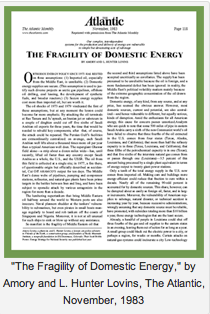While the pirates of Disneyland swaggered around an imaginary 17th century Caribbean, the 21st century pirates of Somalia, a rag-tag bunch of 1,500 men with nothing to lose and millions of dollars to gain, patrol the Gulf of Aden, holding the world hostage. Still, it is difficult, at least for me, not to take a moment to savor the image of a supertanker stowing $100 million worth of a climate-threatening fossil fuel literally stuck in the water—a perversely green turn of events.
Nor was it news to Amory and L. Hunter Lovins who, 25 years ago this month, penned a long article for The Atlantic magazine spelling out in great detail the dangers of sprawling energy delivery networks:
On shipping: (emphasis added)
…The lumbering supertankers that bring Middle Eastern
oil halfway around the world to Western ports are also
insecure. Naval planners shudder at the tankers’ vulnerability
to submarines, but even pirates in small boats manage
regularly to board and rob tankers off the coasts of
Singapore and Nigeria. Moreover, it is not at all unusual.
(Also see the Bowoto vs. Chevron case currently working its way through U.S. Courts. At issue: Whether the oil giant, enlisting the Nigerian military, used lethal force against unarmed peaceful protesters who occupied an oil platform.)
On drilling for oil off the coast of the U.S.:
Offshore oil is favored by the secretary of the interior,
James Watt, as a secure substitute for Persian Gulf oil. The
Coast Guard says that in good weather it could put a vessel
alongside a threatened platform in the main Gulf of Mexico
fields in eight hours. Only an incompetent saboteur could
fail to destroy the platform in eight minutes.
Our research revealed a comprehensive denial of reality:
policy-makers tend to be so preoccupied with Persian Gulf
oil that they fail to consider the frailty of their favorite
alternatives. The Trans-Alaska Pipeline, for example, carries
a seventh of all the crude oil fed to American refineries.
Its failure would cost more than $700 per second *, and
in three winter weeks could turn the line into “the world’s
biggest Chapstick,” as 9 million barrels of hot oil congealed
inside. (The pipeline’s proprietors believe that the
pumps are powerful enough to get the oil moving again,
but no one knows for sure.)
* (Ed. note: 1982 dollars)
Beyond Alaska, a simple Google search yields a gusher of problem pipeline stories. Indeed, one website – “Iraq Pipeline Watch“ lists 469 incidents just in that one country going back to 2003 (as of March 2008, only sporadic updates).
On alternatives:
According to a study released by the Solar Energy
Research Institute in 1981, the U.S. could double its energy
efficiency and convert at least a third of its energy supply
to renewable sources within the next two decades. The
institute’s data suggest that such a shift could save several
trillion dollars, make the energy sector deflationary, and
provide as many as a million jobs.
When the Lovins’ wrote their article, foreign oil imports accounted for slightly more than 28% of US consumption. Today, that percentage has roughly doubled. The US also faces stiff competition for resources—primarily from China and India —and a much more volatile and vulnerable world.
After decades of lemonade-out-of-lemons “teachable moments,” haven’t we learnedanything? Maybe. The new Obama administration has made jump-starting a “green economy” a top priority. It’s a win-win-win for jobs, energy independence and climate change.
What if pirates boarded an oil supertanker and no one minded? In fact, for “sequestering carbon,” they’d be paid, no extortion required. That’s the kind of easy booty that would bring a rum-soaked grin to Captain Jack’s face. Aye, matey. Yo ho to that.
* The “1 in 10″ figure is a bit misleading, as the New York Times' Catherine Rampell explains










